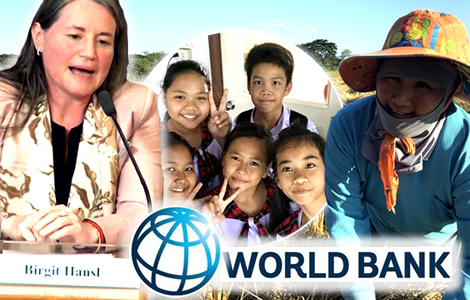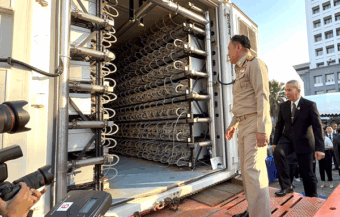BANGKOK: The poverty rate from 2014 to 2015 was cut by a massive 31.43% in one year but since then it has crept back to the same level as the country’s economic growth rates have faltered. Of course, this was all even before the striking slowdown of the economy from 2019 and the crisis which has beset Thailand because of the Coronavirus which has decimated economic growth across the board including tourism.
A World Bank report has highlighted that Thailand’s rate of poverty has reversed its three-decade-long decline in the 3 years from 2015 and 2018 and has called on the government to focus educational and health supports on the younger generation in an already declining workforce as the best approach to helping Thai households caught in a poverty trap.

The latest World Bank report has some dismaying news for the Thai government as it profiles the economic outlook for the kingdom.
It shows that from 2015 to 2018, the decades-long trend of poverty rates being reduced in Thailand has come to a halt and reversed itself quite dramatically.
However, the latest figures should be read in the context of the massive reduction in poverty achieved in one year from 2014 to 2015.
The analysis highlights that as well as worrying about the short term impact of coronavirus, a highly valued Thai baht hindering exports, falling tourist numbers and challenges to the manufacturing base, the kingdom is also now facing long term problems.
1.85 million more people in poverty within 3 years
The impact of the new trend has seen the poverty rate in the kingdom rise from 7.2% to 9.8% in three years with 1.85 million people more living in poverty as the figure rose from 4.85 million to 6.76 million in absolute terms.
However, the data must be looked at from the perspective that the poverty rate in Thailand in 2014, when the junta government took control, stood at 10.5%. In the next year, this rate was slashed to 7.2%, a reduction of 31.43%.
Poverty has inched upwards in 61 out of 77 provinces
The trend was seen across all Thai regions and in 61 out of 77 provinces. The hardest-hit areas included the Isan region or the northeast of the kingdom but the central region of the country has also suffered. Over half a million Thai people in each area dropped beneath the poverty line.
A departure from a three-decade-long trend
The figures mark a significant departure from a trend in the last three decades in which poverty rates drastically reduced from 67% in 1988 to 7.2% in 2015.
However, Thailand’s poverty rate has also ebbed and flowed in prior decades rising from 1970 to 1988.
Many factors at play not least demographics
Of course, there are multiple factors at play here including demographics and world economic trends but a significant factor is political instability and the impact of military coups on Thailand’s international relationships and consequent trade development.
One should also be aware of a possible lag in the figures between cause and effect.
However, underlying these figures, it is quite likely that one of the biggest impacting factors is Thailand’s chronic demographics issue and ageing population as well as efforts to contain the country’s household debt problem.
Thailand’s growth rate has dropped off faster than its neighbours in Asia in recent years
Commenting on the figures this week, The World Bank stated that the rise in poverty is due to challenges which are both economic and environmental.
The bank also noted that that the kingdom’s growth rate had dropped off faster than its Asian neighbours.
The details released by the World Bank cover the period to 2018 even before the decline in Thailand’s economic fortunes from March 2019 when exports began to contract and manufacturing industry began to lay off workers.
Growth rate for 2019 a paltry 2.4%, one bank estimates 0.5% for 2020, rising risk of recession
Thailand’s revised growth rate for 2019 was only 2.4%.
Last week, Kasikorn Research, the economic analysis and research arm of Kasikorn Bank slashed the expected growth rate for the Thai economy to 0.5% from 2.7% and there is now thought to be an increasing chance of the kingdom falling into recession.
Certainly, this looks likely for the first two quarters which will mean at least a technical recession.
Aside from the growing emergency of the coronavirus, which the government can only fight by decisively casting economic considerations to one side, the country is also being hit hard this year by a severe drought directly impacting agriculture output.
World Bank chief says Thai households are more vulnerable to economic shocks and a weak economy
‘Recent poverty trends demonstrate that despite Thailand’s level of economic development, households are still vulnerable to shocks and weak economic conditions,’ observed Birgit Hansl who is the country manager of the bank in Thailand.
‘To meet Thailand’s aspiration of achieving high-income status, Thai households will need better protection from income shocks such as ill-health, job-loss and natural disasters. It will be equally important to support the creation of more productive and higher-paying jobs.’
Praise for authorities on the country’s infrastructure in education, electricity and water services
The World Bank reports credits the Thai government for some aspects of the economy such as school participation, its electricity infrastructure and household services regime including water and sanitation.
It highlighted that economic inequality from 2015 to 2018 had seen 40% of the Thai population being affected by lower levels of income and economic consumption.
‘Better understanding of vulnerability’ is required by Thai leaders says World Bank economist Judy Yang
An economist with the World Bank, Judy Yang, called for a stronger understanding of vulnerability by Thai government planners when formulating economic policy and prescribed an eclectic mix of objectives for the government to achieve, balanced between responding to short term challenges and creating long term jobs for the future.
‘A more nuanced picture of inequity and a better understanding of vulnerability will be needed to guide Thailand’s next steps towards building a more prosperous society for all,’ Ms Yang pronounced. ‘Eliminating persistent pockets of poverty will require growth strategies that take into account short-run risk mitigation and long-run investment needs.’
Finance Minister in Hong Kong this year emphasised the economic transformation agenda of this government as its key mission
This year, in Hong Kong, Thailand’s Finance Minister Uttama Savanayana insisted that despite shorter-term stimulus measures and efforts to control the Thai baht, the government was committed to transforming the economy.
However, the World Bank is calling for what it terms a safety net to be developed as well as efforts to create a long term plan based on higher-quality jobs.
Foreign investors and the government itself have already identified education and the skill sets of young Thai people entering the workforce as the key to this.
Focus on the younger generation
In its report, the World Bank called on the Thai government to focus on the younger generation amid a decrease in the workforce as the key to helping many Thai households, now locked in a poverty trap.
It called for every Thai child to be given a shot with better educational and health supports to reach a higher standard of living.
Further reading:
Thailand economic prospects are dimming fast even as global agencies talk about its strength
Finance minister ready to take further action to prevent the Thai economy falling into recession


















